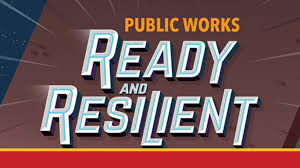PTSD and Public-works Employees
by Dr. Raymond B. Flannery Jr. on

I remember Uncle Harry in my younger days as a happy, hard-working husband and father of two. Outgoing and gregarious, he was always upbeat and helpful. He enjoyed his public-works job as a way to help his community, he idolized his family, and he would do anything to help others.
But it changed. It changed in my first year in college. It changed when the twelve-story Bellevue Hotel pancaked during an earthquake. In the ensuing chaos, first responders worked feverishly to rescue hotel guests. What local citizens may not have realized was that their own public-works employees were also onsite. They secured the perimeter, brought in needed supplies, and slowly began to remove floors of steel and concrete one floor at a time to assist the first responders who were seeking to find survivors. The public-works employees also used heavy equipment as well as their bare hands in the search for survivors. As was true of the first responders, they too uncovered human remains, human remains in pools of blood with faces crushed beyond recognition. The risk for psychological trauma and posttraumatic stress disorder (PTSD) was very high for those working onsite.
As they completed their work and withdrew, the first responders received mental-health services. The public-works employees received no counseling and had to return to the site daily for the next four months to clean up the debris and restore the infrastructure that had been destroyed in the collapse. These visits stirred traumatic memories each day.
Uncle Harry was never the same after this incident. Our happy, ebullient uncle descended into a silent withdrawal and depression.
Most of us do not think about our city or town’s public works until something goes wrong. The streets flood, the streetlights go dark, E. coli bacteria are found in the water supply. We wait until basic functioning is restored and are grateful for the public-works employees who restored normal daily routines. These may be government employees or employees of contractors who provide public-works services that are paid for by some government agency.
What many of us may also not realize is these same public-works employees have a second major component to their job descriptions. It was not until 2003, by United States Presidential decree, that they were designated as “emergency providers,” who could be activated in times of critical incidents [1]. When deployed, they are responsible for securing the perimeter, rescuing victims, bringing in needed supplies, restoring infrastructure and services so that normal daily life can begin again.
It is well-established that critical incidents may result in the onset of PTSD in first responders (police, firefighters, paramedics) called to the scene. The question arose as to whether public-works employees, in their role as emergency providers, were subject to the same risk of onset. The early thinking was that they were not directly involved and therefore not subject to PTSD. One of the results of this decision was that public-works emergency providers were not offered the routine mental-health services provided to first responders.
A recent literature-review sought again to assess the possibility for this risk in public-works employees [2]. This review studied the literature from 1980 to 2020 and found that there were 24 studies that included both government and contracted employees. These studies included 94,302 employees who provided public-workers services in a variety of natural/manmade disasters, terrorist incidents, and various acts of human-perpetrated violence. The studies were worldwide in scope and covered research from North America, Europe, and Asia.
Every single study reported participants who were subject to psychological trauma/PTSD when deployed to these critical incidents. In many studies this PTSD was left untreated and the disrupting symptoms lasted for over a decade. Various studies also reported on the presence of the comorbid conditions often present with PTSD. These included serious depression, intense anxiety, and substance use. Moreover, 3 studies additionally examined possible somatic consequences of being onsite in critical incidents. They found cardiac issues, pulmonary disease, and hyperperarousal/insomnia. Mental-health services, which are routinely provided to first responders, were offered to only 0.08% these public-works employees.
The original assumption that public-works employees were not impacted has been proved incorrect by subsequent research. In fact, the presence of PTSD in public-works providers is similar to other professional groups present at critical incidents: coroners, trauma surgeons receiving incident victims, and news reporters [3]. The recent data indicate the need for public-works employees, when working critical incidents, to routinely receive mental-health services. These could include medications for anxiety and depression as well as various forms of counseling. Crisis-intervention approaches may be of particular helpfulness [4].
References
4. Flannery, R. B. Jr. The Assaulted Staff Action Program (ASAP): Coping with the Psychological Aftermath of Violence. Riverdale, NY: American Mental Health Foundation, 2012.
______________________________________________________________________________
Dr. Raymond B. Flannery Jr., Ph.D. FACLP, is an internationally recognized scholar and lecturer on the topics of violence, victimization, and stress management. Dr. Flannery is available for lectures and workshops for all types of groups and may be reached at The American Mental Health Foundation: 212.737.9027 elomke[at]americanmentalhealthfoundation.org.
If you found the information contained herein of import, The American Mental Health Foundation requests you give generously by clicking here and scrolling to the PayPal link. Thank you for visiting this website and for your support.








 Host Companion
Host Companion